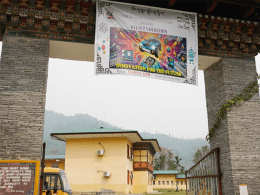In a step toward promoting local produce and sustainability, Monggar town’s vegetable market will soon introduce a dedicated counter for eco-friendly packaging and labelling of locally grown vegetables. The initiative, spearheaded by the Horticulture Association of Bhutan, aims to enhance the visibility, authenticity, and market reach of products from the eastern region.
To prepare vendors for this transition, over 30 vegetable sellers from Monggar recently completed a five-day training program on eco-friendly packaging and labelling. The training, funded by the Canada Fund for Local Initiatives, focused on using natural materials like banana and other broad leaves for wrapping produce, and creating clear, informative labels that include product origin, shelf life, and producer contact details.
Enhancing Authenticity and Market Access
The project seeks to help local farmers and vendors build stronger connections with consumers through improved product presentation. “One of the main reasons is to enhance market access, which is easier with proper packaging and simple yet detailed labels. It also ensures authenticity. If our beaten corn or tengma reaches Thimphu, customers will immediately recognize it as a product from Monggar,” said Paras Adhikari, Economic Development and Marketing Officer of Monggar.
The Horticulture Association plans to establish Monggar as a central hub for eco-friendly packaging and labelling in eastern Bhutan. “We’ve considered the geographical and market opportunities. Monggar serves as a commercial centre for six eastern districts, so expanding the initiative from here makes sense,” explained Tashi Dhendup, Secretary General of the association.
Building Trust Among Consumers
Local vendors believe the initiative will help maintain the integrity of their products and improve consumer confidence. “This will help us build our reputation and ensure accountability. There were cases where old and new produce were mixed and sold, which disappointed customers. With proper labelling, such practices can be avoided,” said Sonam Dorji, a vegetable vendor from Monggar.
Another vendor, Tshering Yangki, added, “It will help us maintain records and ensure quality. With proper labelling, consumers can make informed choices, and we can promote premium-quality produce from Monggar.”
Sustainable Traditions Revived
The training also encouraged vendors to draw from traditional Bhutanese practices. “In the past, farmers used banana leaves to store butter. Reviving such eco-friendly methods benefits both the environment and local farmers. It’s about blending tradition with modern marketing,” said Dorji Tshering, one of the trainers.
Looking Ahead
With machines currently being procured, the packaging and labelling project is expected to launch later this year. Once operational, Monggar’s market will not only stand out for its commitment to sustainability but also serve as a model for other districts in promoting environmentally responsible commerce.
By integrating innovation with local wisdom, this initiative promises to strengthen Monggar’s agricultural identity—ensuring that every labelled packet tells the story of its origin, its people, and their shared commitment to authenticity and sustainability.








